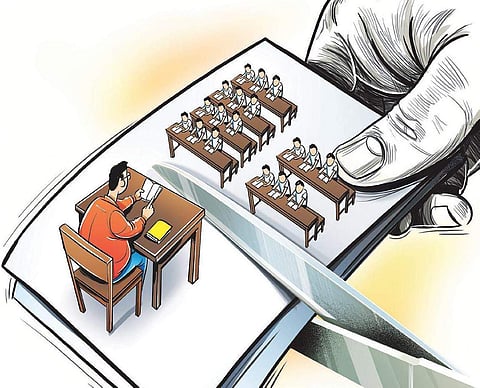

HYDERABAD: The faculty of engineering colleges, who were unhappy with the relaxation in the student-faculty ratio (SFR) to 20:1 by the AICTE earlier this year which led to loss of more than a lakh jobs, are now furious at the National Board of Accreditation’s latest proposal to further reduce it to 25:1. According to the faculty, such reduction in the student-faculty ratio would result in a loss of jobs for a large number of teachers and a massive pay cut for remaining senior teaching faculty in engineering colleges.
It may be recalled that when All India Council for Technical Education (AICTE) revised its SFR from 15:1 to 20:1 at the beginning of the present academic year, 1.5 lakh teachers in engineering colleges across the nation lost their jobs. In Telangana alone, the number of teachers who were given pink slips was estimated to be over 10,000. The recent controversy started when the National Board of Accreditation (NBA), an autonomous body under the AICTE that deals with accreditation of engineering colleges, released its new notification, in which it stated that an SFR of 25:1 would be required for the accreditation of UG engineering programmes for up to three years, and 15:1 for the six years.
However, teachers claimed that implementation of this rule would only encourage malpractices like the kind that is being witnessed at Jawaharlal Nehru Technological University, which is now engaged in weeding out fake degrees and staff with dubious credentials.
Another malpractice that runs rampant and that would aggravate further if NBA’s notification is implemented, according the teachers, is creation of fake IDs. Though directed by the Supreme Court, AICTE has not digitalised the process of faculty inspection based on details of their salary paid through banks in the last one year.
According to KM Karthik, founder of All India Private Colleges Employees Union (AIPCEU), the staff details do not match the approval inspection (by AICTE) and affiliation inspection (by JNTUH) because approval application formats do not take into account official ID number issued to a particular teacher.
“Thus, different ID numbers for the same teachers at a college and AICTE level, offers an opportunity for private colleges, to create fake staff details,” he said. “Without curbing these malpractices, if these bodies implement the 25:1 ratio, it would practically translate to one teacher for 30 students. Which means, there would be roughly two teachers for a class of 60, eight for a branch of 240 students or 40 teachers for a college of 1,200 students. This will wreck havoc in the education system.”
The teachers are also opposing the practice of revising the SFR twice in a year. R Somesh, a lecturer at a Patancheru-based college said: “AICTE and NBA keep changing the ratio without consulting students and teachers. This only proves there is a nexus between AICTE, NBA and the college managements, whose demand has been to reduce in the ratio to 25:1 so that they can make more money and pay less.”
The proposal may become a norm in 2019-20 AICTE approval process handbook. And even if it doesn’t, everyone would likely comply because of UGC and MHRD’s insistence on accreditation. Getting accredited also allows colleges to collect `3,000 annually as accreditation fees.
“This roughly amounts to `10 lakh additional revenue every year. Colleges have also mastered the art of changing their reports and even website as per the requirement of the body they are dealing with. For instance a college has shown it has 30 members in AICTE and JNTU reports but for NBA it states it has 47 teaching staff. This is on their official college website,” said Ramakrishna Reddy, president of Technical Institutions Employees Association.
UGC: Include innovation, entrepreneurship in curriculum
Hyderabad: In a bid to promote a culture of innovation and entrepreneurship, the University Grants Commission (UGC) has asked all higher education institutions in the country to set up intellectual property centres and innovation labs. Setting up entrepreneurship cells and making entrepreneurship as part of the curriculum are the other activities prescribed by UGC.
“The startups, innovators and entrepreneurs from across the country have appreciably applied their creativity to address social issues. However, it is further needed that a culture of innovation and entrepreneurship must be promoted as there is no dearth of grassroots level innovations in the country and efforts must be made to facilitate their growth,” stated a circular released by the regulatory body. In addition to setting up Intellectual Property Centres at universities and entrepreneurship cells, it has also suggested organising entrepreneurship focus events, boot camps and investor sessions and take up initiatives under the Startup India. Establishing innovation labs, on the model of Atal Tinkering Labs, is another measure prescribed by the UGC.
‘Changes are inevitable’
While admitting that teachers will lose jobs if the new SFR is implemented, a senior faculty member of OU’s University College of Engineering said that such changes are inevitable. “AICTE is introducing its model curriculum. The role of teacher is changing to that of a guide who doesn’t teach but aid the teaching process. Relaxing the ratio seems to be a step in the direction, though it might not affect learning outcomes of students as much employment of teachers,” he said.